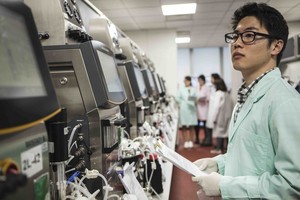Korean biosimilars giant Samsung Bioepis has extended its commercialization agreement with Biogen to include biosimilars to two ophthalmology drugs, Lucentis (ranibizumab) and Eylea (aflibercept). The agreement also allows Biogen to commercialize Samsung’s blockbuster anti-inflammatories in Europe for an additional five years.
Samsung Bioepis expands biosimilars agreement with Biogen
Home/Pharma News
|
Posted 06/12/2019
 0
Post your comment
0
Post your comment

The agreement with American multinational Biogen will cover Samsung Bioepis ophthalmology biosimilar candidates: ranibizumab and aflibercept.
Ranibizumab is a monoclonal antibody fragment, generated from the same parent antibody as cancer drug bevacizumab (Avastin). Ranibizumab is used to treat age-related macular degeneration (AMD), which causes vision loss in old age. It has been marketed in the US as Lucentis by Genentech, where costs can reach US$2,000 per dose. Samsung Bioepis biosimilar, currently named SB11, is undergoing a phase III clinical trial in AMD patients [1].
Aflibercept is also used to treat AMD and has been marketed by Regeneron Pharmaceuticals under the brand name Eylea. Like bevacizumab, aflibercept inhibits vascular endothelial growth factor (VEGF) and is therefore also under investigation as a cancer treatment. Samsung Bioepis biosimilar candidate (SB15) is currently in the preclinical development stages.
The agreement includes an option for Biogen to commercialize Samsung Bioepis anti-inflammatory medicines in Europe for an additional five years, including etanercept (Benepali), infliximab (Flixabi) and adalimumab (Imraldi). These medicines target the inflammatory cytokine tumour necrosis factor (TNF) and have together treated over 180,000 patients in Europe.
The agreement also gives Biogen the option to commercialize these anti-inflammation drugs in China, in exchange for sales royalties. In total under the agreement, Samsung Bioepis will receive upfront payments of US$100 million and up to US$270 million in milestone/option payments (as well as sharing of sales revenue). They will be responsible for development, registration and manufacture while Biogen will be responsible for commercialization.
President of Samsung Bioepis Christopher Hansung Ko said ‘In Europe, we have been very pleased with Biogen’s commercialization efforts with our anti-TNF medicines, fulfilling the mission of expanding access to high quality medicines to patients across Europe. By building on this collaboration, we are excited to potentially expand the opportunity for patients living with ophthalmological conditions, who do not have access to life-changing medicines’.
Biogen’s CEO, Michel Vounatsos, said the company is excited to move into a new therapeutic area and new geographical regions. ‘This transaction would expand the potential for our leading biosimilars business worldwide, while complementing Biogen’s presence in ophthalmology’.
Samsung Bioepis is expecting to achieve sales of over US$850 million from its biosimilars in 2019, and for the first time to generate an operating profit. However, the company will soon need to compete with a rival ranibizumab biosimilar, developed by Swiss pharmaceutical company Bioeq.
Coherus Biosciences recently announced that they have acquired the exclusive rights to commercialize Bioeq’s ranibizumab biosimilar (FYB201) in the US. Bioeq aims to file a license application with the Food and Drug Administration (FDA) before the end of 2019 and Coherus plans to launch the product on the US market in 2021.
Related article
Samsung Bioepis starts phase III trial for eculizumab copy biological
Reference
1. GaBI Online - Generics and Biosimilars Initiative. Biosimilars of ranibizumab [www.gabionline.net]. Mol, Belgium: Pro Pharma Communications International; [cited 2019 Dec 6]. Available from: www.gabionline.net/Biosimilars/General/Biosimilars-of-ranibizumab
Permission granted to reproduce for personal and non-commercial use only. All other reproduction, copy or reprinting of all or part of any ‘Content’ found on this website is strictly prohibited without the prior consent of the publisher. Contact the publisher to obtain permission before redistributing.
Copyright – Unless otherwise stated all contents of this website are © 2019 Pro Pharma Communications International. All Rights Reserved.
Source: Bioeq, Samsung Bioepis
Guidelines
US guidance to remove biosimilar comparative efficacy studies
New guidance for biologicals in Pakistan and Hong Kong’s independent drug regulatory authority
Policies & Legislation
EU accepts results from FDA GMP inspections for sites outside the US
WHO to remove animal tests and establish 17 reference standards for biologicals
Formycon signs new aflibercept biosimilar pacts and launches ranivisio in Europe

Home/Pharma News Posted 13/11/2025
Bio-Thera and Stada expand biosimilars alliance to include tocilizumab

Home/Pharma News Posted 20/10/2025
The best selling biotechnology drugs of 2008: the next biosimilars targets








Post your comment